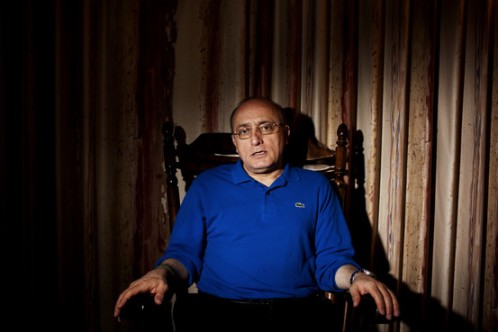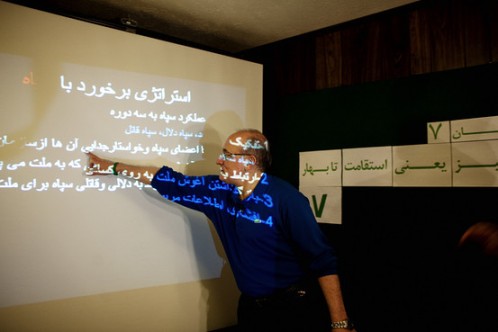By FARNAZ FASSIHI
http://online.wsj.com/article/SB125980542530173987.html?mod=article-outset-box
VIENNA, Va. -- From a dim basement just down the street from a train station here, Mohsen Sazegara is working to overthrow the leadership of Iran.
He's done it before. Thirty years ago, as a hot-headed young revolutionary in a Paris suburb, he helped topple Iran's last monarch, the shah, putting today's Islamic regime in power.

Matt Eich/Luceo Images for The Wall Street Journal.
Mohsen Sazegara makes opposition videos in his Virginia basement.
"Iranians across the world have found each other again," says Mr. Sazegara, sipping homemade sour-cherry juice, an Iranian summertime drink, in his basement. Thirty years ago he co-founded the Revolutionary Guards, Iran's feared security force. Today he makes YouTube videos teaching Iranians how to evade the Revolutionary Guards and stage nonviolent uprisings.
Mr. Sazegara's unusual career -- from revolutionary, to ultimate Tehran insider, to opposition video maker in his basement -- helps explain why Iran is especially worried about the global nature of the "Green Movement" calling for regime change in Iran. His weekly videos rack up thousands of hits.
He's one of several prominent Iranian figures pressing the cause world-wide. Iranian filmmaker Mohsen Makhmalbaf traveled to Washington, D.C., in recent weeks to plead for economic sanctions against Iran. Akbar Ganji, a former journalist who uncovered killings of lawyers, journalists and writers by Iran's regime, has organized rallies and hunger strikes in New York attracting thousands.
Part of Mr. Sazegara's influence stems from the fact that he split from the regime after decades walking its halls of power.
He got his start as a young revolutionary back in the 1970s, quitting graduate school in the U.S. to join with Ayatollah Ruhollah Khomeini, the Islamic state's founding father, then an exile in Paris. Mr. Sazegara became the ayatollah's speechwriter.

Matt Eich/Luceo Images for The Wall Street Journal
Mr. Sazegara works with his son Shahab, 25, to prepare the material that they will record later that evening.
After the shah's overthrow, Mr. Sazegara returned to Iran. He served as the head of state radio and deputy prime minister, among other jobs, and co-founded the Revolutionary Guards. The original premise of the Guards, he says, was a people's army to insulate against coups.
Mr. Sazegara has a checkered reputation. Some Iranians still blame him for arrests and executions in Iran in the 1980s. Mr. Sazegara has said the actions happened in the past and need to be judged in that context.
Iran's political landscape shifted in 1997 when a reform-minded president promised more social openness. When those reforms failed to materialize, Mr. Sazegara went his separate way. He criticized Iran's leadership and publicly claimed the 1979 Islamic revolution had failed to deliver its promise of freedom and democracy.
He became particularly vocal about his brainchild, the Revolutionary Guards, giving radio interviews and writing commentary suggesting the Guards were contaminating the regime. By this time, the Guards were extending their power over politics, finance, media and security.
In 2004, Mr. Sazegara was jailed for his criticism, and later fled the country. Today he calls Iran's government "a religious dictatorship" and the Revolutionary Guards "a corrupt and dangerous mafia."
"I believe the only solution for Iran is a liberal, democratic and secular government," he says. "We need to overhaul the constitution."
This summer's election in Iran presented an opportunity, he believes. The controversial re-election of Iran's hard-line president, Mahmoud Ahmadinejad, spurred protests in Iran, followed by a bloody crackdown.
Mr. Sazegara turned his suburban Virginia home, with its many Persian carpets on the floor, into the de facto U.S. headquarters of Iran's opposition. Phones ring constantly. His wife, a physician, monitors blogs and Web sites from a laptop on the dining-room table. And in the basement, Mr. Sazegara cranks out videos recorded by his son. He delivers 10-minute lessons on civil disobedience, drawing on his knowledge from having helped build Iran's complex security apparatus.
"From remote villages in Iran to the streets of Los Angeles, we now stand united," he says in one video. "You must not give up."